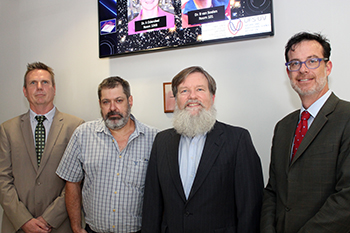Latest News Archive
Please select Category, Year, and then Month to display items
29 March 2022
|
Story Teli Mothabeng
|
Photo Supplied
![]() Philmon Bitso, Student Recruitment Officer, with the top-10 cohort of the class of 2021 Free State Star of Stars.
Philmon Bitso, Student Recruitment Officer, with the top-10 cohort of the class of 2021 Free State Star of Stars.
The Department of Student Recruitment Services at the University of the Free State (UFS) hosted its annual Free State Star of Stars competition at the Amanzi Private Game Reserve during the first week of March. The event saw some of the brightest young minds in the Free State inducted as UFS first-year students into this year’s top-10 cohort for the competition. This marks the first Star of Stars event since the beginning of the COVID-19 pandemic.
.jpg?Status=Master&sfvrsn=d7324e20_1)
This new cohort consists of a dynamic group of academically gifted students from Quintile 1-3 schools in the Free State who are currently enrolled for different UFS academic programmes, ranging from Medicine, Law, Education, and various Bachelor of Science courses. Many of these students had to overcome insurmountable challenges to perform as well as they did in their Grade 12 academic year and to become part of the top-10 cohort for the class of 2021. Due to the COVID-19 pandemic, the Department of Student Recruitment Services was forced to take a different approach to celebrate these deserving students; consequently, a weekend-long induction camp was the substitute for the annual gala dinner.
Apply for the 2022 Free State Star of Stars competition
The UFS realised the need to establish a platform that recognises and celebrates the diverse and, in most instances, difficult circumstances that disadvantaged schools (Quintile 1-3) are facing. Consequently, the Star of Stars competition was developed and established in 2016. This competition provides disadvantaged Grade 12 learners from all districts in the Free State an opportunity to showcase their excellence, while motivating them to aspire to achieve more.
NASA Deep Space Navigation engineer presents at Naval Hill Planetarium
2017-03-30

From the left: Chris du Plessis; US Consulate, Johannesburg,
Prof Petrus Meintjes; Dept of Physics UFS, Christopher Jacobs;
NASA, and Anthony Deaton; US Consulate Johannesburg.
Photo: Rulanzen Martin
The University of the Free State (UFS) hosted NASA Deep Space engineer Christopher Jacobs on 27 March 2017 at the Bloemfontein Campus. The engagement was hosted by Prof Matie Hoffman of the Department of Physics and the Department of Institutional Advancement, in collaboration with the US Consulate General in Johannesburg.
Jacobs is stationed at NASA’s Jet Propulsion Laboratory (JPL) at the California Institute of Technology and has served as the Reference Frame Calibration task manager for 25 years. In this role he has been responsible for delivering the reference frames used to navigate NASA missions such as the Mars Science Laboratory to planetary targets.
His visit to the UFS included a presentation to the Department of Astrophysics at the Faculty of Natural and Agricultural Sciences and at the Naval Hill Planetarium in Bloemfontein where he spoke on Stellar GPS: Navigating the Solar System. He also spoke about the latest research and developments at NASA in Astrometry. The visit will establish and develop shared interests and possible collaboration with UFS and other institutions of interest in the country. “South Africa, because of its well-placed geographic location in the southern hemisphere, holds a lot of answers to astronomy,” Jacobs said.
He has an active interest in professional and public education, and outreach, having given public lectures around the world. “Astronomy brings people together and is a point of common interest that is key in solving environmental and geographical challenges such as climate change, therefore global cooperation is important,” he said.
Prof Hoffman welcomed the initiative by the US Consulate and the possible outcomes of joint efforts to position the UFS as a key partner in South Africa on NASA’s astronomy projects. In the coming weeks Jacobs will speak at high schools in Gauteng including the Mae Jemison US Science Reading Room in Mamelodi, Pretoria, a centre that is focused on promoting science education.